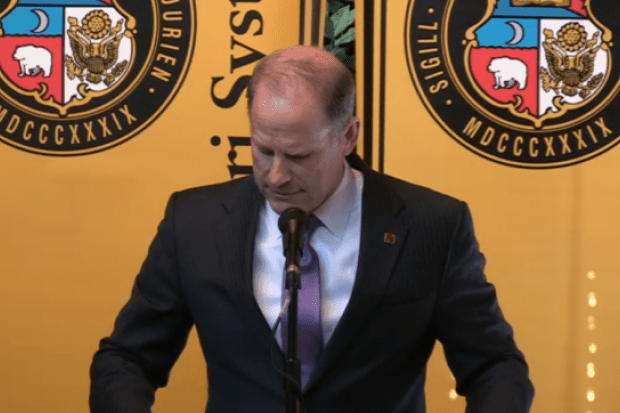Amid escalating tensions, students protesting what they see as a culture of racism at the University of Missouri have successfully ousted the system’s president, Tim Wolfe, and the chancellor of its flagship institution at Columbia, R. Bowen Loftin.
Wolfe resigned yesterday, after student and faculty activists had been asking his administration for weeks to combat racism on the Columbia campus. Protesters say that they were ignored and that, when they finally did meet with the system leader, he minimised their concerns, Inside Higher Ed reported.
The system’s governing board on Monday also announced that Loftin would step down in January. In addition, the board promised a number of initiatives aimed at promoting diversity and inclusion.
Perhaps the most visible moment of disconnect between the students and their leaders came at the October homecoming parade, when a group of black students, members of the organisation Concerned Student 1950, confronted Wolfe while the president sat in the back seat of a convertible during the procession. Wolfe refused to get out of the car and engage students, and some students claim that the car struck them, although the university disputes those claims.
Unrest has continued to snowball since the incident, and critics say that his response was too delayed. Wolfe met with student activists two weeks later, but the two sides apparently did not find much common ground. And when he did apologise, it was nearly a month after the parade.
Meanwhile, after the parade and other allegations of racist incidents at the flagship campus in Columbia, a graduate student went on a hunger strike and a group of black players on the football team – with their coach expressing support on Twitter – vowed to boycott games until the president resigned.
Over the weekend, students set up camp on campus and said that they would remain there until Wolfe resigned. Several others, from two Republican lawmakers to the state’s governor to graduate student groups, also called for Wolfe’s resignation. On Monday, the university’s student government formally called for Wolfe’s resignation, and faculty members encouraged students to walk out of classes in protest over Wolfe’s leadership.
“The frustration and anger that I see is clear, real, and I don’t doubt it for a second,” Wolfe said in an at times emotional address to the university. “We stopped listening to each other, we didn’t respond and react, we got frustrated with each other.”
Calls for dismissal are not isolated to just Wolfe. On Monday, in a letter sent to the UM Board of Curators, nine Missouri deans said that they wanted to express “our deep concern about the multitude of crises on our flagship campus”. They called for Loftin’s dismissal.
“This thing just exploded,” said E. Gordon Gee, president of West Virginia University and former president of Ohio State University. Gee and several leaders in higher education who were interviewed for this article said that it is extremely rare for a president of a large university system to be forced to resign amid a fervor of student activism.
“The university leadership didn’t respond quickly and forcefully to the issues…they tended to be perhaps too passive,” Gee continued. “Any of these kinds of issues, people look to the leadership of the university to address them.”
When the student government president, who is black, tweeted about how someone called him a racial slur while walking on campus, there was an outpouring of support on Twitter. Yet there was also an outpouring of frustration with the Missouri administration for not responding or reacting to the student’s experience.
Then a student group, the Legion of Black Collegians, posted about how some of its members were also subject to racial slurs while rehearsing for a campus event. Loftin posted a video acknowledging and condemning racism on campus, but Wolfe and fellow system administrators remained silent.
For many frustrated students, the silence was reminiscent of a lack of timely and clear responses to student demands for more minority enrolment, and of the perceived silence following student frustrations after the shooting of unarmed black teenager Michael Brown in Ferguson, made headlines and placed Missouri at the centre of a national conversation about race.
“If you’re in a leadership position, a presidential position, language matters. How you respond matters. The message you send matters. Students in this community wanted to feel that they were heard and the concerns they had were legitimate, and unfortunately they didn’t get that,” said Kevin Kruger, president of NASPA: Student Affairs Administrators in Higher Education.
“Campuses have to respond proactively to incidents related to racial intolerance,” he said. “In today’s world you can’t assume that small acts of protests are isolated.”
On Monday, Donald Cupps, the system governing board’s chairman, issued a forthright apology for the university’s perceived inattention to the concerns expressed by students and others about the racism they perceive at the institution. “Significant changes are required to move us forward. The board is committed to making those changes,” he said.
The board promised to appoint a diversity officer for the system and review student and staff conduct policies, as well as provide additional support for hiring and retaining minorities and assisting students who have experienced discrimination. The board did not make any promises to increase the number of black students enrolled in the system, as has been requested by some protesters.
